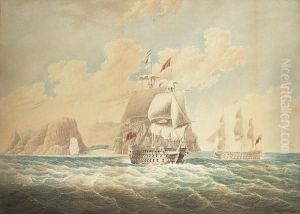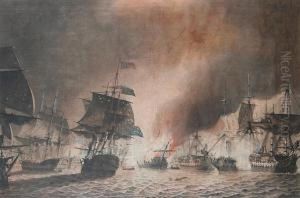John Harris Nicolas Paintings
Sir John Harris Nicolas was not primarily known as an artist but as a distinguished British lawyer, antiquary, and naval historian. Born on March 29, 1788, in Dartmouth, Devon, England, Nicolas's contributions span a diverse range of intellectual endeavors, although his work significantly impacted historical scholarship rather than the traditional visual arts. His interests and expertise were particularly notable in the fields of genealogy, heraldry, and the history of the British Navy, reflecting a broad scholarly ambition rather than a focus on artistic creation.
Nicolas's professional journey was marked by both his legal career and his prolific output as a writer and editor. He was called to the Bar by the Inner Temple in 1816, which laid the foundation for his engagement with legal and historical documents. His dedication to detail and historical accuracy drove him to become a leading figure in the research of naval history, where his works remain influential. Among his most significant contributions is the editing of the 'Naval Chronicle,' a comprehensive account of contemporary naval affairs and history, which has served as an essential resource for researchers and historians.
In addition to his naval histories, Nicolas was deeply involved in the study of medieval English texts, contributing to the understanding of British heraldry and genealogy. His efforts to edit and publish important medieval documents helped preserve and disseminate knowledge of England's past. His legal background played a crucial role in these endeavors, as it equipped him with the skills necessary to decipher and interpret ancient manuscripts.
Despite his lack of direct involvement in the visual arts, Nicolas's work has had a lasting impact on the fields of history and heraldry, influencing how historical and genealogical research is conducted. His dedication to preserving and understanding the past has made him a respected figure among historians and scholars. Sir John Harris Nicolas passed away on August 3, 1848, leaving behind a legacy characterized by an unyielding pursuit of knowledge and a commitment to scholarly excellence.

